

#include <spanningTree.h>
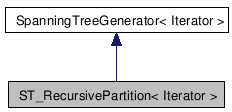
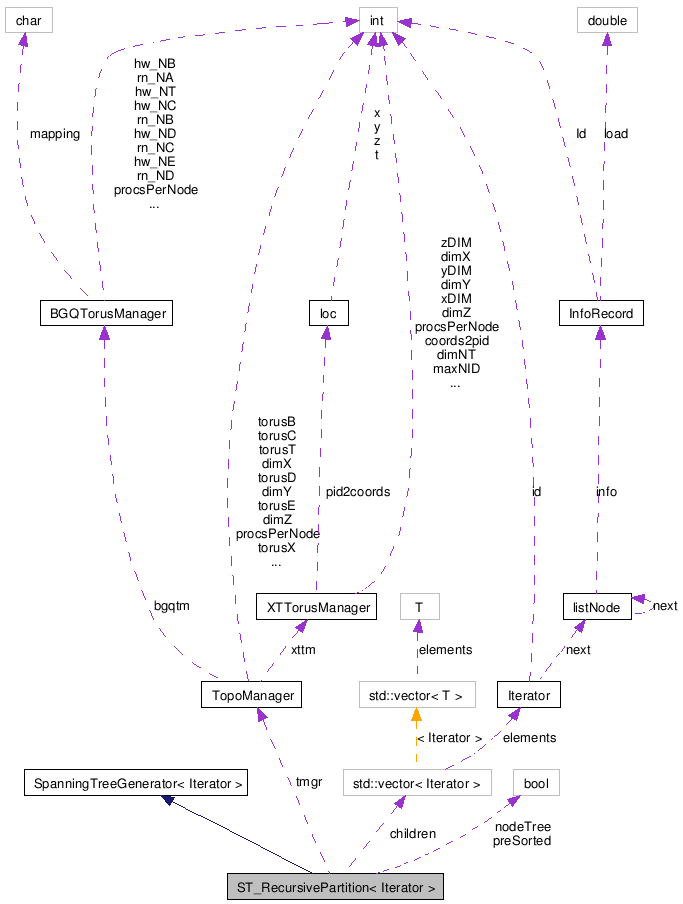
Public Member Functions | |
| ST_RecursivePartition (bool nodeTree=true, bool preSorted=false) | |
| virtual int | buildSpanningTree (Iterator start, Iterator end, unsigned int maxBranches) |
| Will reorder node range so that nodes are grouped by subtree, *and* by phynode. | |
| virtual int | subtreeSize (int subtree) |
| return number of nodes in generated subtree (includes root of subtree) | |
| virtual Iterator | begin (int subtree) |
| return Iterator to first node in generated subtree (i.e. root of subtree) | |
| virtual Iterator | end (int subtree) |
| return Iterator to end of generated subtree | |
Private Member Functions | |
| void | initPhyNodes (Iterator start, Iterator end, std::vector< PhyNode > &phynodes) const |
| void | build (std::vector< PhyNode * > &phyNodes, Iterator start, unsigned int maxBranches) |
| void | partition (std::vector< PhyNode * > &nodes, int start, int end, int numPartitions, std::vector< int > &children) const |
| recursive partitioning of phynodes into numPartitions | |
| void | chooseSubtreeRoots (std::vector< PhyNode * > &phyNodes, std::vector< int > &children) const |
| phyNodes is list of phyNodes, grouped by subtrees (rootPhyNode in position 0) phyNodeChildren contains the indices (in phyNodes) of first node of each subtree | |
| void | bisect (std::vector< PhyNode * > &nodes, int start, int end, int numPartitions, std::vector< int > &children) const |
| void | trisect (std::vector< PhyNode * > &nodes, int start, int end, int numPartitions, std::vector< int > &children) const |
| int | maxSpreadDimension (std::vector< PhyNode * > &nodes, int start, int end) const |
| void | translateCoordinates (std::vector< PhyNode > &nodes) const |
| Translate coordinates of phynodes such that the max spread in each dimension is equal (or closer) to the number of coordinates actually used in that dimension. | |
| void | withinPhyNodeTree (PhyNode &rootPhyNode, int bfactor, Iterator &pos) |
Private Attributes | |
| std::vector< Iterator > | children |
| bool | nodeTree |
| bool | preSorted |
| TopoManager * | tmgr |
Data Structures | |
| class | PhyNode |
| class | PhyNodeCompare |
Will benefit from topology information (coordinates of hosts in the machine, and distance between hosts), but can be used without topology information (and will still be phynode aware).
Works for any N-d mesh/torus, including non-contiguous allocations and holes in allocation (e.g. Blue Waters).
Algorithm complexity is O(n) where n is number of nodes.
Inside a phynode, there will only be one root node, and currently every other node in that phynode is a direct descendant of it (this can be easily changed). Edges between phynodes are only between their corresponding root nodes (as a result there will only be one edge between phynodes).
Definition at line 107 of file spanningTree.h.
| ST_RecursivePartition< Iterator >::ST_RecursivePartition | ( | bool | nodeTree = true, |
|
| bool | preSorted = false | |||
| ) | [inline] |
| nodeTree | true if forming tree of nodes, false if tree of pes. | |
| preSorted | true if nodes will be provided grouped by phynode. Allows using slightly more efficient implementation. |
Definition at line 72 of file spanningTree.C.
References BGConverse::CkMyNode(), TopoManager::getDimSize(), TopoManager::getNumDims(), TopoManager::getTopoManager(), TopoManager::haveTopologyInfo(), and ST_RecursivePartition< Iterator >::tmgr.
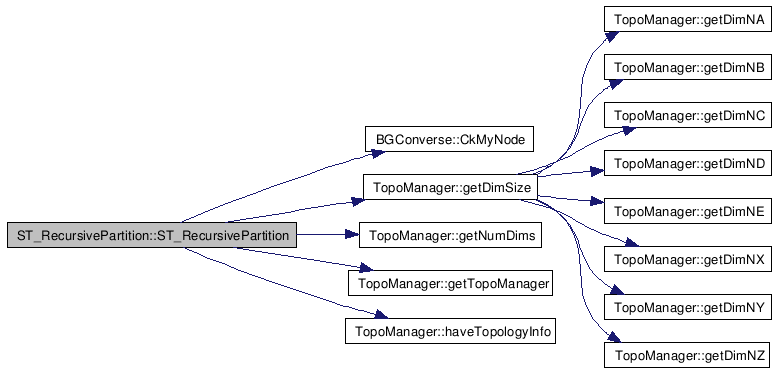
| int ST_RecursivePartition< Iterator >::buildSpanningTree | ( | Iterator | start, | |
| Iterator | end, | |||
| unsigned int | maxBranches | |||
| ) | [inline, virtual] |
Will reorder node range so that nodes are grouped by subtree, *and* by phynode.
| maxBranches | Max number of children in different phynode as root |
Implements SpanningTreeGenerator< Iterator >.
Definition at line 92 of file spanningTree.C.
References ST_RecursivePartition< Iterator >::build(), ST_RecursivePartition< Iterator >::children, BGConverse::CkMyNode(), std::distance(), and ST_RecursivePartition< Iterator >::initPhyNodes().
Referenced by getNeighborsTopoTree_R(), and CkMulticastMgr::setup().
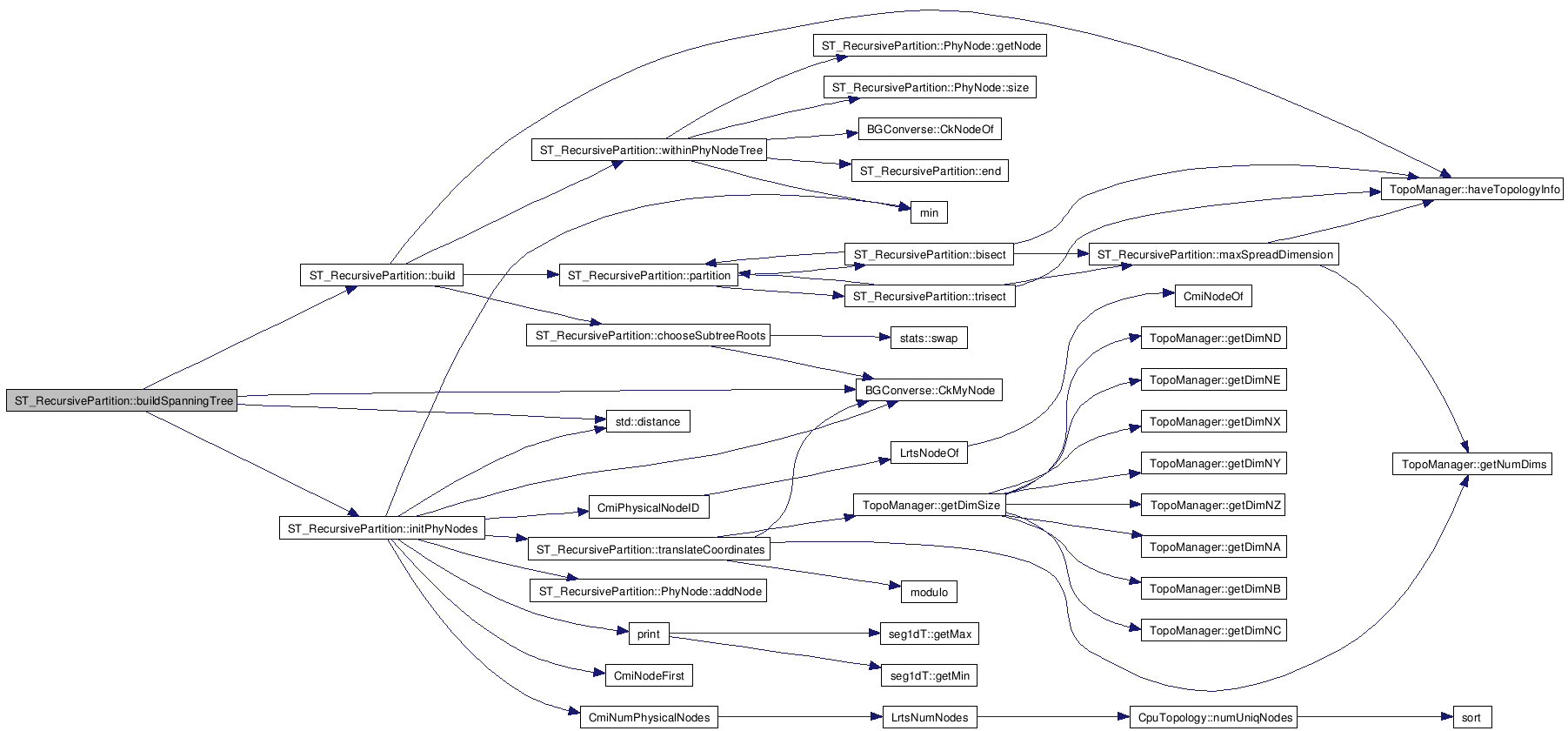

| virtual int ST_RecursivePartition< Iterator >::subtreeSize | ( | int | subtree | ) | [inline, virtual] |
return number of nodes in generated subtree (includes root of subtree)
Implements SpanningTreeGenerator< Iterator >.
Definition at line 125 of file spanningTree.h.
References ST_RecursivePartition< Iterator >::children, and std::distance().
Referenced by CkMulticastMgr::setup().


| virtual Iterator ST_RecursivePartition< Iterator >::begin | ( | int | subtree | ) | [inline, virtual] |
return Iterator to first node in generated subtree (i.e. root of subtree)
Implements SpanningTreeGenerator< Iterator >.
Definition at line 133 of file spanningTree.h.
References ST_RecursivePartition< Iterator >::children.
Referenced by getNeighborsTopoTree_R(), and CkMulticastMgr::setup().
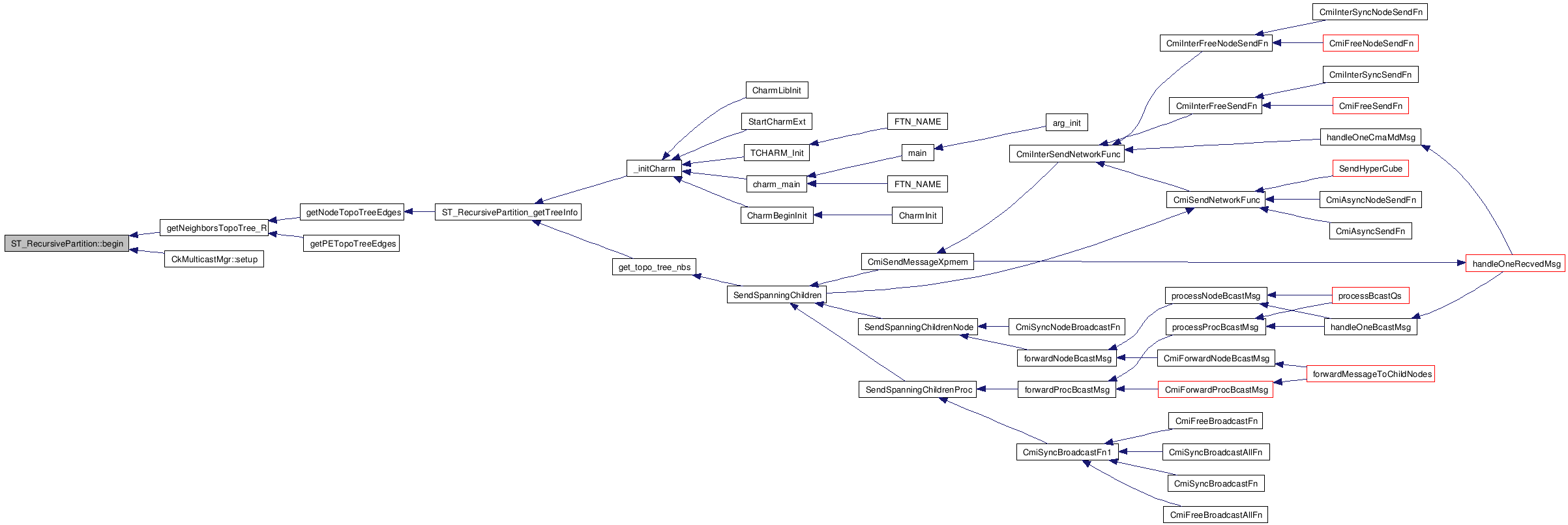
| virtual Iterator ST_RecursivePartition< Iterator >::end | ( | int | subtree | ) | [inline, virtual] |
return Iterator to end of generated subtree
Implements SpanningTreeGenerator< Iterator >.
Definition at line 141 of file spanningTree.h.
References ST_RecursivePartition< Iterator >::children.
Referenced by getNeighborsTopoTree_R(), CkMulticastMgr::setup(), and ST_RecursivePartition< Iterator >::withinPhyNodeTree().

| void ST_RecursivePartition< Iterator >::initPhyNodes | ( | Iterator | start, | |
| Iterator | end, | |||
| std::vector< PhyNode > & | phynodes | |||
| ) | const [inline, private] |
Definition at line 129 of file spanningTree.C.
References ST_RecursivePartition< Iterator >::PhyNode< Iterator >::addNode(), BGConverse::CkMyNode(), CmiNodeFirst(), CmiNumPhysicalNodes(), CmiPhysicalNodeID(), std::distance(), int, min(), n, ST_RecursivePartition< Iterator >::nodeTree, ST_RecursivePartition< Iterator >::preSorted, print(), ST_RecursivePartition< Iterator >::tmgr, and ST_RecursivePartition< Iterator >::translateCoordinates().
Referenced by ST_RecursivePartition< Iterator >::buildSpanningTree().


| void ST_RecursivePartition< Iterator >::build | ( | std::vector< PhyNode * > & | phyNodes, | |
| Iterator | start, | |||
| unsigned int | maxBranches | |||
| ) | [inline, private] |
Definition at line 228 of file spanningTree.C.
References ST_RecursivePartition< Iterator >::children, ST_RecursivePartition< Iterator >::chooseSubtreeRoots(), TopoManager::haveTopologyInfo(), ST_RecursivePartition< Iterator >::partition(), ST_RecursivePartition< Iterator >::tmgr, and ST_RecursivePartition< Iterator >::withinPhyNodeTree().
Referenced by ST_RecursivePartition< Iterator >::buildSpanningTree().


| void ST_RecursivePartition< Iterator >::partition | ( | std::vector< PhyNode * > & | nodes, | |
| int | start, | |||
| int | end, | |||
| int | numPartitions, | |||
| std::vector< int > & | children | |||
| ) | const [inline, private] |
recursive partitioning of phynodes into numPartitions
Definition at line 300 of file spanningTree.C.
References ST_RecursivePartition< Iterator >::bisect(), and ST_RecursivePartition< Iterator >::trisect().
Referenced by ST_RecursivePartition< Iterator >::bisect(), ST_RecursivePartition< Iterator >::build(), and ST_RecursivePartition< Iterator >::trisect().


| void ST_RecursivePartition< Iterator >::chooseSubtreeRoots | ( | std::vector< PhyNode * > & | phyNodes, | |
| std::vector< int > & | children | |||
| ) | const [inline, private] |
phyNodes is list of phyNodes, grouped by subtrees (rootPhyNode in position 0) phyNodeChildren contains the indices (in phyNodes) of first node of each subtree
Definition at line 276 of file spanningTree.C.
References BGConverse::CkMyNode(), PUP::d, stats::swap(), and ST_RecursivePartition< Iterator >::tmgr.
Referenced by ST_RecursivePartition< Iterator >::build().


| void ST_RecursivePartition< Iterator >::bisect | ( | std::vector< PhyNode * > & | nodes, | |
| int | start, | |||
| int | end, | |||
| int | numPartitions, | |||
| std::vector< int > & | children | |||
| ) | const [inline, private] |
Definition at line 329 of file spanningTree.C.
References TopoManager::haveTopologyInfo(), ST_RecursivePartition< Iterator >::maxSpreadDimension(), ST_RecursivePartition< Iterator >::partition(), and ST_RecursivePartition< Iterator >::tmgr.
Referenced by ST_RecursivePartition< Iterator >::partition().


| void ST_RecursivePartition< Iterator >::trisect | ( | std::vector< PhyNode * > & | nodes, | |
| int | start, | |||
| int | end, | |||
| int | numPartitions, | |||
| std::vector< int > & | children | |||
| ) | const [inline, private] |
Pin the location of the 1/3 and 2/3 elements
Partition the three pieces further
Definition at line 352 of file spanningTree.C.
References TopoManager::haveTopologyInfo(), ST_RecursivePartition< Iterator >::maxSpreadDimension(), ST_RecursivePartition< Iterator >::partition(), and ST_RecursivePartition< Iterator >::tmgr.
Referenced by ST_RecursivePartition< Iterator >::partition().


| int ST_RecursivePartition< Iterator >::maxSpreadDimension | ( | std::vector< PhyNode * > & | nodes, | |
| int | start, | |||
| int | end | |||
| ) | const [inline, private] |
Definition at line 377 of file spanningTree.C.
References c, ST_RecursivePartition< Iterator >::PhyNode< Iterator >::coords, count, TopoManager::getNumDims(), TopoManager::haveTopologyInfo(), n, ST_RecursivePartition< Iterator >::tmgr, and used.
Referenced by ST_RecursivePartition< Iterator >::bisect(), and ST_RecursivePartition< Iterator >::trisect().


| void ST_RecursivePartition< Iterator >::translateCoordinates | ( | std::vector< PhyNode > & | nodes | ) | const [inline, private] |
Translate coordinates of phynodes such that the max spread in each dimension is equal (or closer) to the number of coordinates actually used in that dimension.
In other words, "moves" all phynodes by some translation offset so that their bounding box includes minimum number of coordinates, which implies that adjacent nodes won't go through torus edges. Works for any number of dimensions (N-d torus)
Definition at line 412 of file spanningTree.C.
References c, BGConverse::CkMyNode(), ST_RecursivePartition< Iterator >::PhyNode< Iterator >::coords, count, direction, TopoManager::getDimSize(), TopoManager::getNumDims(), PUP::m, modulo(), n, ST_RecursivePartition< Iterator >::tmgr, and x.
Referenced by ST_RecursivePartition< Iterator >::initPhyNodes().
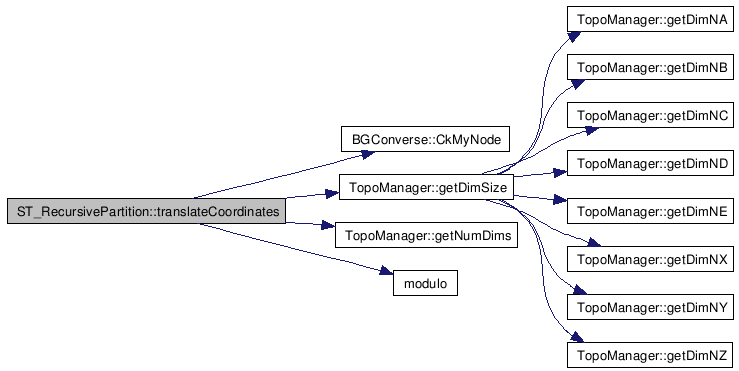

| void ST_RecursivePartition< Iterator >::withinPhyNodeTree | ( | PhyNode & | rootPhyNode, | |
| int | bfactor, | |||
| Iterator & | pos | |||
| ) | [inline, private] |
Definition at line 181 of file spanningTree.C.
References ST_RecursivePartition< Iterator >::children, BGConverse::CkNodeOf(), ST_RecursivePartition< Iterator >::end(), ST_RecursivePartition< Iterator >::PhyNode< Iterator >::getNode(), min(), n, ST_RecursivePartition< Iterator >::PhyNode< Iterator >::nodes, ST_RecursivePartition< Iterator >::nodeTree, and ST_RecursivePartition< Iterator >::PhyNode< Iterator >::size().
Referenced by ST_RecursivePartition< Iterator >::build().
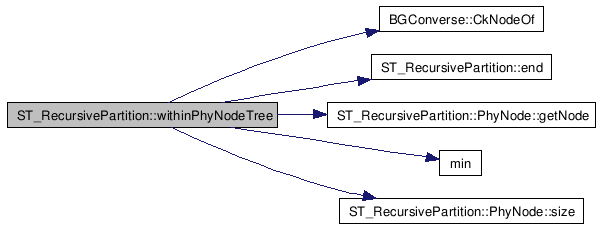

std::vector<Iterator> ST_RecursivePartition< Iterator >::children [private] |
Definition at line 171 of file spanningTree.h.
Referenced by ST_RecursivePartition< Iterator >::begin(), ST_RecursivePartition< Iterator >::build(), ST_RecursivePartition< Iterator >::buildSpanningTree(), ST_RecursivePartition< Iterator >::end(), ST_RecursivePartition< Iterator >::subtreeSize(), and ST_RecursivePartition< Iterator >::withinPhyNodeTree().
bool ST_RecursivePartition< Iterator >::nodeTree [private] |
Definition at line 172 of file spanningTree.h.
Referenced by ST_RecursivePartition< Iterator >::initPhyNodes(), and ST_RecursivePartition< Iterator >::withinPhyNodeTree().
bool ST_RecursivePartition< Iterator >::preSorted [private] |
Definition at line 173 of file spanningTree.h.
Referenced by ST_RecursivePartition< Iterator >::initPhyNodes().
TopoManager* ST_RecursivePartition< Iterator >::tmgr [private] |
Definition at line 174 of file spanningTree.h.
Referenced by ST_RecursivePartition< Iterator >::bisect(), ST_RecursivePartition< Iterator >::build(), ST_RecursivePartition< Iterator >::chooseSubtreeRoots(), ST_RecursivePartition< Iterator >::initPhyNodes(), ST_RecursivePartition< Iterator >::maxSpreadDimension(), ST_RecursivePartition< Iterator >::ST_RecursivePartition(), ST_RecursivePartition< Iterator >::translateCoordinates(), and ST_RecursivePartition< Iterator >::trisect().
 1.5.5
1.5.5